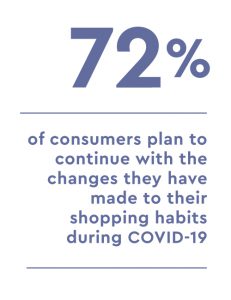
Make Way for the New “Conscious Consumer” – Acting Ethically and Sustainability Will Be Key for Brand Success
Since the pandemic began some months ago now, a lot has changed for society. One of the more positive outcomes has been the increased awareness of our impact on the environment. During lockdown, the world witnessed a sharp drop in carbon emissions and, whilst considered a drop in the ocean compared to what needs to be done to tackle climate change, many saw this as call for drastic action.

During the pandemic we interviewed consumers from the UK, France, and Ireland to see how this new level of consciousness for the environment had transferred to the world of retail – and in particular how consumer attitudes had changed towards online shopping. The report, named Selling Sustainability: Adapting to the New Conscious Consumer’, found that 37% of UK and Irish shoppers are now more conscious of the effect their online shopping habits had on the environment than before the pandemic.
In fact, 73% of consumers said they now expect online retailers and brands to use recyclable packaging or minimise their use of packaging altogether.
Needless to say, demands around sustainability had already been increasing for some time. However, COVID-19 has accelerated this upward trend and brands must act now in order to support it. In today’s volatile retail market, brands simply cannot afford to ignore the needs of this new “conscious consumer”. They must not only be aware of these changes, but also maintain positive changes themselves to continue to positively impact customer loyalty.
So, how can brands respond to the needs of the new “conscious consumer”?
1. Accepting sustainability as the new normal
Adjusting to the new landscape may be difficult at first, but, if brands want to provide an improved customer experience then it is an issue that must be tackled sooner rather than later. Being transparent and open about products will help brands to maintain healthy communication with their consumers and stay ahead of competitors. Over a third (35%) stated that when they make a purchase the product must be naturally, locally or sustainably sourced, while 56% of respondents said they prefer to buy products that can be delivered within their own country.

2. Communication is key
Maintaining this positive landscape is only possible if brands communicate their practices with consumers. Research has found that 42% of consumers believe that the products they return are reused or recycled when in reality 5 billion pounds of waste is generated through returns each year. Clearly, there is a need for change as if online retailers and brands communicated that returns go to landfill, 71% of consumers said they would change their online shopping habits.
3. Maintaining positive change

Consumers are now actively seeking online retailers and brands who stand by their sustainability credentials. Our research shows that 72% of consumers plan to continue with their changed shopping habits following the pandemic. Businesses must pay attention to this new consumer as acting sustainably will be better for the planet, but also for business continuity. Consumers now have more choice than ever before and will quickly turn to competitors.
Looking forward to the new world of retail
Brands must stay ahead of the consumer while positively impacting customer experience and brand loyalty. They can do this by working quickly to understand the new needs of the “conscious consumer” and identify how they can cater to these new sustainability expectations.
Shoppers can see straight through empty words, so brands must make sure they are being authentic. Brands that meet the needs of the conscious consumer and consider what, where and how their products are sourced, will be in the best possible position to thrive.
Acting ethically is now not only the right thing to do, but the most profitable thing to do for long-term growth. Just last month, luxury department store Selfridges launched its first in-house and online wardrobe rental service to crack down on fashion waste, whilst global fashion brands like H&M continue to encourage customers to hand in unwanted clothes, amongst other sustainability initiatives. Those that genuinely care about the environment and successfully communicate this with consumers, will be the ones with the brightest future.


